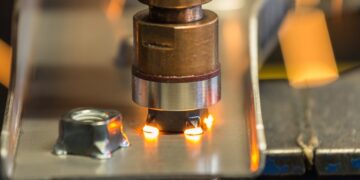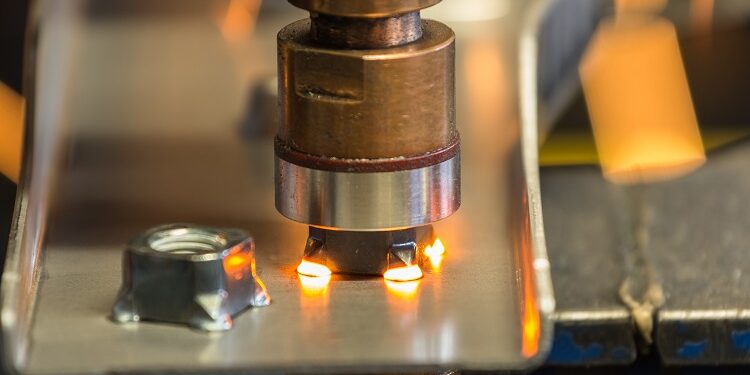Capacitor discharge welding (CDW) is a unique and efficient resistance welding process that utilizes stored electrical energy to create strong, localized welds. Unlike traditional resistance welding methods that rely on continuous current flow, CDW employs a rapid discharge of high-voltage energy from capacitors to achieve the weld. This method offers several advantages, making it ideal for specific welding applications.
This article explores the world of capacitor discharge welding machines, delving into their functionalities, benefits, and key considerations when selecting a supplier or manufacturer for your needs.
The Power of Capacitor Discharge Welding
CDW machines operate by storing electrical energy in a bank of capacitors. Once charged, this energy is rapidly discharged through the weld head, creating a high-intensity current pulse that flows through the workpieces being joined. This intense current creates localized heating at the point of contact, melting the materials and forming a strong weld upon solidification.
The entire welding process in CDW occurs within milliseconds, making it an incredibly fast and efficient method. Additionally, the rapid heating minimizes heat transfer to surrounding areas, reducing distortion and heat-affected zones (HAZ) in the base metal.
Advantages of Capacitor Discharge Welding
There are several compelling reasons to consider CDW for your welding needs:
-
Speed and Efficiency: The rapid discharge of energy in CDW translates to incredibly fast weld times, often in the range of milliseconds. This high speed makes it ideal for high-volume production environments.
-
Minimal Heat Affected Zone (HAZ): Due to the short welding cycle, CDW minimizes heat transfer to surrounding areas, resulting in a narrow HAZ. This is particularly beneficial for welding thin materials or components sensitive to heat distortion.
-
Clean and Consistent Welds: The rapid heating and cooling cycle of CDW promotes clean and consistent welds with minimal spatter or porosity.
-
Versatility: CDW can weld a wide range of materials, including dissimilar metals, thin sheets, and even those with high electrical conductivity, which can be challenging for traditional resistance welding methods.
-
Reduced Power Consumption: Since CDW relies on stored energy rather than continuous current flow, it offers lower overall power consumption compared to some resistance welding methods.
Applications of Capacitor Discharge Welding
CDW finds application in various industries due to its unique advantages. Here are some common uses:
-
Automotive Industry: Joining electrical components, attaching studs and fasteners to sheet metal parts, and welding battery tabs are all common applications of CDW in the automotive sector.
-
Aerospace Industry: CDW is used for welding lightweight materials like aluminum and titanium in aircraft components.
-
Electronics Industry: Attaching electronic components to printed circuit boards (PCBs) and welding wires and connectors are well-suited for CDW due to its clean and precise welds.
-
Appliance Manufacturing: Joining thin sheet metal components in appliances like refrigerators and washing machines is another common application.
-
Construction and HVAC: Welding dissimilar metals like copper pipes to steel brackets or attaching fasteners to thin metal sheets are applications of CDW in construction and HVAC industries.
Choosing the Right Capacitor Discharge Welding Machine Supplier
With the potential benefits of CDW in mind, selecting the right capacitor discharge welding machine manufacturer of supplier becomes crucial. Here are some key factors to consider:
-
Machine Capabilities: Different CDW machines offer varying capabilities in terms of power output, weld current, and weld time. Carefully evaluate your specific needs and choose a machine with adequate power to achieve the desired welds for your material thickness and joint type.
-
Application Suitability: Consider the specific materials you intend to weld and ensure the chosen machine is compatible with those materials. Some manufacturers offer specialized CDW machines for specific applications like stud welding or wire bonding.
-
Automation Options: Depending on your production volume and desired level of automation, consider features like automated weld cycles, robotic integration capabilities, and data logging functionalities.
-
Reputation and Customer Service: Look for a supplier with a proven track record of manufacturing high-quality CDW machines. Positive customer reviews and testimonials can indicate a supplier’s commitment to reliability and performance.
-
Availability of Service and Support: After-sales service and support are crucial for long-term machine operation. Choose a supplier who offers readily available technical support, spare parts availability, and maintenance assistance.
-
Training and User-Friendliness: The complexity of the CDW machine should align with your operator’s skillset. Ensure the supplier provides adequate training for operating and maintaining the machine. Additionally, prioritize user-friendly control interfaces to minimize operator error.
-
Compliance and Safety Standards: CDW machines should adhere to relevant safety regulations and industry standards. Choose a supplier that prioritizes safe operation and provides certification documentation for the machine.
-
Warranty and Guarantee: A comprehensive warranty on the machine and its components offers peace of mind and demonstrates the supplier’s confidence in their product quality.
Additional Considerations
Beyond the core factors mentioned above, there are some additional considerations that might be relevant depending on your specific needs:
-
Machine Footprint: The size and footprint of the CDW machine can be crucial if you have limited space in your production area. Some suppliers offer compact and portable CDW machines suitable for smaller workspaces.
-
Integration with Existing Equipment: If you plan to integrate the CDW machine into an existing production line, ensure compatibility with your current equipment and control systems.
-
Cost and Value Proposition: CDW machines can vary significantly in price based on capabilities and features. It’s essential to consider the long-term value proposition, factoring in potential cost savings through increased productivity, reduced rework, and lower maintenance requirements.
Conclusion
Capacitor discharge welding offers a powerful and efficient solution for various welding applications. By carefully considering your needs and evaluating potential suppliers based on the factors outlined above, you can select the right CDW machine to enhance your welding capabilities and achieve optimal production results. Remember, partnering with a reputable supplier who prioritizes quality, customer service, and ongoing support is vital for ensuring a successful and long-lasting investment in CDW technology.
-




















































